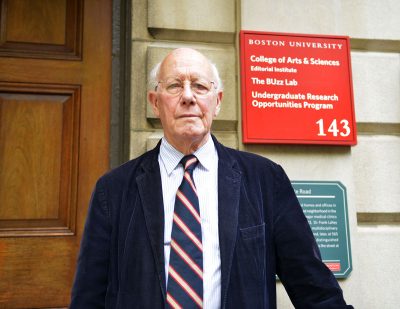
Long before the Swedish Academy awarded Bob Dylan with the Nobel Prize in Literature, scholars at Boston University, especially Editorial Institute professor Christopher Ricks, had been studying and teaching Dylan’s work through the lens of poetry.
Ricks said his interest in Dylan started in 1968, after he listened to Dylan’s song, “Desolation Row.” Dylan’s voice, along with the words he wrote and performed, made music into literature, Ricks said.
“If you think of literature as the wonderfully effective use of words to remind us of good old things, to show us wonderful new things, to show us how much in life is explainable, and to show us how much of life is not explainable at all,” Ricks said. “Then if you have this very high view of what literature and words can do, there is nobody who uses words better than [Dylan] does.”
Previous leaders of the university further motivated Rick’s drive to pursue the study of Dylan’s music, applauding his efforts and taking a keen interest in the his work, Ricks said. Through the encouragement of former BU presidents John Silber and Jon Westling, the professor’s passion for understanding Dylan’s work on a deeper level was continuously fostered, Ricks said.
“My relation to Dylan’s art is terrifically bound up with BU,” he said. “People who cared about BU and ran it in those days cared what some of the faculty wrote. Jon Westling was a president who believed in cultural occasions that were also social and intellectual occasions.”
Westling wrote in an email that he supported Ricks’ research because of how dedicated the professor was to Dylan’s artistry.
“The fact that Ricks, one of the best readers ever of English poetry, regarded Dylan so highly did influence my decision to bring Dylan to the university,” Westling wrote. “I hope that Dylan recognizes just how fortunate he is that his work has met in professor Ricks a critic fully capable of understanding and explaining its subtlety and power.”
Dylan performed at BU on Nov. 10, 2000 to more than 4,500 students.
Ricks’ thoughts regarding the intersectionality between Dylan’s music and literature finally came to fruition in 2005, when he wrote “Dylan’s Vision of Sin.”
“The book does take him very seriously as an artist, takes his words very seriously, and thinks that his words illuminate Milton, Shakespeare, Keats and Elliot’s words,” Ricks said.
Other faculty members took interest in Dylan’s work — Kevin Barents, a lecturer in the Arts and Sciences Writing Program, taught the course “Music and Poetry of Bob Dylan” with College of Fine Arts professor Jeremy Yudkin. Barents said he was inspired to teach a class on Dylan after reading Ricks’ work.
“I first decided to propose an academic course on Dylan’s lyrics after reading Ricks’ ‘Dylan’s Visions of Sin,’” Barents said. “Ricks in particular is able to bring to bear on Dylan’s lyrics a lifetime of deep familiarity with the literary, historical and cultural ‘touchstones’ of our world, touchstones that Dylan alludes to and makes use of as much as any poet or novelist does.”
Yudkin said he views the songwriting accomplishments of Dylan on a similar level as Ricks does, especially the musician’s skill with words.
“There is no other songwriter who has achieved anything remotely like the quality of [Dylan’s] creative achievement,” Yudkin said. “Every great writer and every great songwriter borrows; this one has made songs from which everyone will borrow for generations. He is an American original.”
Several students said they were glad to see some BU professors linked Dylan’s work to literature. Some even said Ricks’ study was why Dylan won the Nobel Prize in Literature.
John D’Alessandro, a senior in the Questrom School of Business, said music can affect all individuals in a variety of ways.
“[Ricks] is very right when he says that music can be a form of literature because it can speak to anybody and definitely has a lot of meaning behind it,” D’Alessandro said.
Madison Norman, a sophomore in Questrom, said she is glad Dylan’s work was beyond recognized beyond the realm of music.
“It’s good that someone came out and made a comment because musicians at times really do work hard on their song lyrics, so it can be considered literature,” Norman said. “Although this is the first time [that a musician is recognized for literature values], maybe this is going to be a start of a new trend.”
Eric Chang, a junior in the College of Arts and Sciences, said he supports the work of Ricks, and said he believes the professor’s argument may have helped Dylan win the Nobel Prize in Literature.
“[Ricks] is right because, with a lot of songs, they are sort of telling a story about what the artist is thinking at the time, Chang said, “so it could be seen as a form of literature rather than just a song.”

















































































































